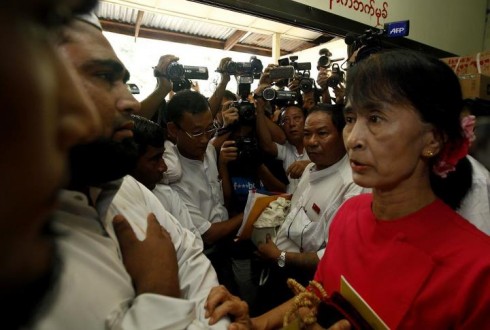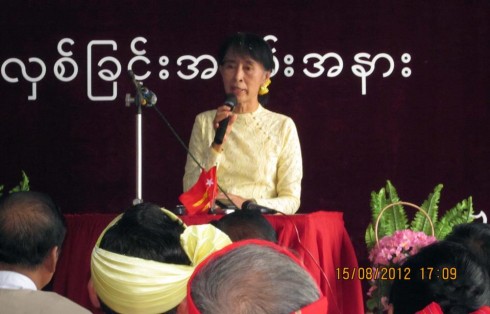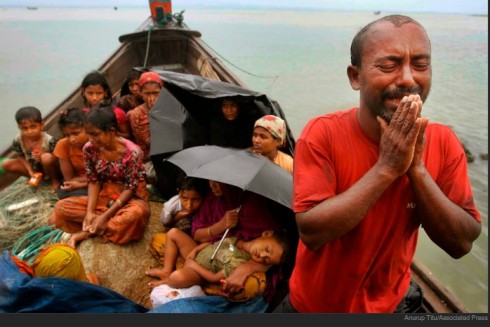Statement by civil society organisations deeply concerned by violence against stateless Rohingya
UPDATE 2012-07-30
NGO warns of ‘second tragedy’ in western Burma | Democratic Voice of Burma: http://bit.ly/NR1Dtz
___________________
http://www.hrw.org/burma #economy #humanrights
http://physiciansforhumanrights.org/places/burma
http://www.burmacampaign.org.uk/news-and-reports
Radio Free Asia’s mission is to provide accurate and timely news and information to Asian countries whose governments prohibit access to a free press. Guided by the core principles of freedom of expression and opinion, RFA serves its listeners by providing information critical for informed decision-making. http://www.rfa.org/burmese
Radio Free Asia (RFA) is a private, nonprofit corporation that broadcasts news and information to listeners in Asian countries where full, accurate, and timely news reports are unavailable.
__________________________
United Nations Human Rights “The underlying tensions that stem from discrimination against ethnic and religious minorities pose a threat to Myanmar’s democratic transition and stability,” said UN expert on the human rights situation in Myanmar Tomás Ojea Quintana. More: http://bit.ly/LDoDep
__________________________
Myanmar democracy leader Aung San Suu Kyi comforts Muslim men who came and ask for help at the National League for Democracy (NLD) party headquarters, Yangon, Myanmar, 6 June 2012. Credit: EPA/NYEIN CHAN NAING
The Rohingya (Burmese: ရိုဟင်ဂျာ) are a Muslim people who live in the Arakan region. As of 2012, 800,000 Rohingya live in Myanmar. According to the UN, they are one of the most persecuted minorities in the world. http://en.wikipedia.org/wiki/Rohingya_people
Rohingya (Ruáingga) is a language spoken by the Rohingya people of Arakan (Rakhine/Rohang), Burma (Myanmar).[1][2] It is related to the Chittagonian language spoken in the neighboring southeastern Chittagong Division of Bangladesh. http://en.wikipedia.org/wiki/Rohingya_language
The Indo-Iranian language group constitutes the easternmost extant branch of the Indo-European family of languages. It consists of three language groups: the Indo-Aryan, Iranian and Nuristani. The Indo-Iranian languages occasionally go by the term „Aryan languages“.[1] The speakers of the Proto-Indo-Iranian language, the hypothetical Proto-Indo-Iranians, are usually associated with the late 3rd millennium BC Andronovo and Sintashta-Petrovka cultures of Central Asia. Their expansion is believed to have been connected with the invention of the chariot. http://en.wikipedia.org/wiki/Indo-Iranian_languages
Civil Society Organisations Deeply Concerned by On-going Violence against Stateless Rohingya in Myanmar and their Refoulement from Bangladesh
The stateless Rohingya of Myanmar have suffered from extreme persecution and discrimination for decades. They are now facing another crisis. On 3 June inter-communal violence erupted, and this has evolved into large-scale state sponsored violence against the Rohingya. Despite this, neighbouring Bangladesh is not allowing them to enter to seek refuge. The Rohingya population needs urgent measures to be taken for their protection.
In Myanmar, what began as inter-communal violence has evolved into large-scale state sponsored violence against the Rohingya. The violence began on 3 June 2012 and has mainly occurred in Sittwe and Maungdaw. On 10 June, a state of military emergency was declared, after which the military became more actively involved in committing acts of violence and other human rights abuses against the Rohingya including killings and mass scale arrests of Rohingya men and boys in North Rakhine State. Many Rohingya continue to be victims of violence and cannot leave their homes for fear of persecution, and are thus deprived of their livelihood and most basic needs. The urgent humanitarian needs of those displaced (IDPs) – including those not in IDP camps – are not being adequately met and there is concern that those displaced will not be allowed to return to their homes as soon as it is safe to do so, thus creating a situation of protracted displacement.
Heartbreaking photo of a Muslim refugee from Myanmar pleading with Bangladesh to let him in. Bangladesh has turned back 1,500 refugees fleeing violence between majority Rakhine Buddhists and minority Rohingya Muslims in western Myanmar. http://nyti.ms/LKzzFE
Bangladesh, in contravention of its international legal obligations, closed its border and pushed back many Rohingya fleeing the violence and persecution in Myanmar. The refoulement of these refugees by Bangladesh to Myanmar where they face a very immediate threat to life and freedom, and a danger of irreparable harm; and the manner of refoulement, by push backs into dangerous waters, including in unsafe vessels are matters of serious concern.
The legal obligations of both Myanmar and Bangladesh require them to protect all persons within their territories or subject to their jurisdictions, regardless of whether they are citizens, stateless persons or refugees. In their treatment of the Rohingya, both countries have violated the right to life, the right to be free from torture or cruel, inhuman or degrading treatment or punishment, the right to liberty and freedom from arbitrary detention, the right to food and shelter including the fundamental right to be free from hunger and the right to the highest attainable standard of health. Bangladesh has also acted in violation of the rights to seek and to enjoy asylum and not to be subjected to refoulement.
We therefore recommend that both states immediately uphold their human rights obligations in this situation.
In particular, we recommend that the Government of Myanmar and the Rakhine State authorities take immediate steps to:
1. Stop the violence.
2. Stop the arbitrary arrests of Rohingya and abuses by security forces against them.
3. Allow unhindered humanitarian access to assist all those in need as a result of the crisis, including internally-displaced people staying outside camps and those hosting them.
4. Allow the displaced to return to their homes once it is safe and they feel safe to return, and ensure that a situation of protracted displacement is avoided.
5. Allow an international inquiry into the abuses committed since June 2012 in Rakhine State.
We recommend the Government of Bangladesh take immediate steps to:
1. Open its borders to refugees and to stop refoulement of refugees.
Further, we call on the international community to:
1. Provide financial support for the humanitarian operation needed to assist people affected by the crisis in Rakhine State.
2. Support the government of Bangladesh in providing protection to Rohingya refugees.
3. Engage with the Governments of Myanmar and Bangladesh in relation to the above recommendations.
We also recommend that the reform process in Myanmar address existing policies of discrimination against the Rohingya; and that this current crisis be used as an opportunity to address the longstanding problems between the communities in Rakhine State, and to promote a constructive dialogue aiming at peace and reconciliation.
http://www.hrw.org/burma
http://physiciansforhumanrights.org/places/burma
http://www.facebook.com/burmacampaign
http://www.facebook.com/democratic voice of burma
http://www.facebook.com/pages/RFA-Burmese
http://www.facebook.com/burmavjmedia
http://www.facebook.com/pages/Burma-News-from-Mizzima
#previous #articles #videos #burma
#previous #articles #videos #refugee
Myanmar: “Sunday’s by-elections, key test of democratic reform process,” says UN expert
GENEVA (30 March 2012) – The United Nations Special Rapporteur on the human rights situation in Myanmar, Tomás Ojea Quintana, said that Myanmar’s by-elections on 1 April will be a key test of progress made by the Government in its process of reform. In the coming polls, 48 parliamentary seats will be contested. More: http://bit.ly/HoYm3k
Comments are closed.


